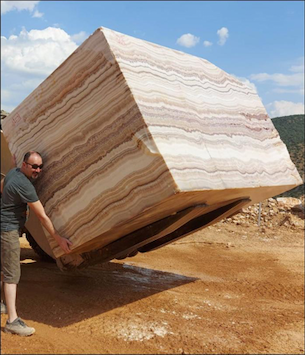Article by: Camila da Paz | Source: Lynn Byrne

Kitchens and bathrooms designed around natural stone slabs have been popping up on the Instagram feeds of design lovers everywhere. It is one of the hottest trends in kitchen and bath design today. Three top designers explain what's behind the trend and offer tips on how to get the look successfully in your own home.
What's driving the Trend
Keeping up with the Jones' is out.
Since natural stones slabs are like snowflakes--no two are alike--it is near impossible for homeowners to have the same looking stone.

According to Young Huh, a New York City designer and board member of the National Kitchen and Bath Association, today's design savvy homeowners are "yearning towards unique extraordinary things." Huh adds that natural stone installations are so eye-catching now because "the organic and singular movement of natural stone sets it apart from engineered bland quartz or what was popular forever, plain white marble."
Background
Of course, like all good trends, designing with natural stone slabs is not new at all. The Barcelona Pavilion, designed in 1929 by Mies van der Rohe, represents the quintessential use of stone slabs.

It features large extravagant expanses of red onyx, marble and travertine. Mies' used this simplicity and natural beauty to achieve what he called "an ideal zone of tranquility."
Perhaps a desire for that zen feeling also explains why today's frenetic homeowners are using large expanses of natural stone in their homes.
Where to put slabs
Learning from the Barcelona Pavilion, it's clear that natural stone should be the focal point. "Install natural stone where it is most eye catching," says Huh, adding that the "look is minimal... but glamorous."

Any large accent wall could work. Think the inside of a glass enclosed shower stall or the walls above a kitchen that has floating shelves. You don't want the beauty of the stone interrupted with medicine cabinets or other closed storage.

Tina Ramchandani, recently named one of House Beautiful's Next Wave designers, cautions against using a solid natural stone slab on floors, especially where it can be wet. "I love the look of stone slabs on floors because you don't have the breaks of grout lines", but "tiles are safest in wet areas," because that grout offers traction. An uninterrupted slab floor can be a bit slippery and dangerous.
Practical Considerations
If you choose to use natural stone, Ramchandani strongly advises that you visit a natural stone shop to see the entire span. "Since stone is a natural material there may be large blemishes or veining that you either love or hate."

The finish also is important. "For kitchens, a leathered finish is great because you don't see as many fingerprints as polished, and it's easier to clean. A honed finish is another great low-maintenance option," says Ramchandani.
Kitchen and bath expert Carla Aston bears her geological chops urging you consider whether the natural stone reacts to acidic chemicals like lemon, wine or tomato sauce.

Aston explains that "Calcareous stone reacts to chemicals (acid) and siliceous stone does not." She adds that "granite, soapstone, slate and quartzite will never etch..... because they are siliceous," while "marble, limestone, travertine, and onyx might." Certainly something to keep in mind when installing a natural stone kitchen countertop. Some homeowners happily accept (and even desire) the patina from etching, while others want their slabs to remain pristine.
Are you ready to install a natural stone in your next renovation? I am having a visual crush. ♡



Comments